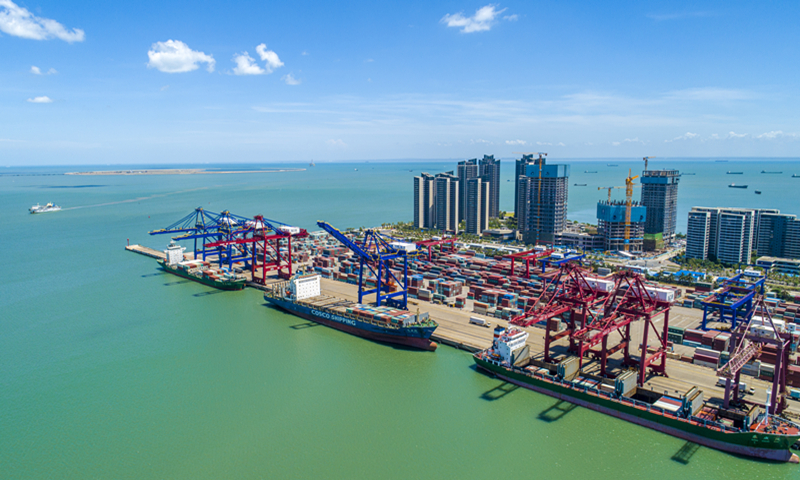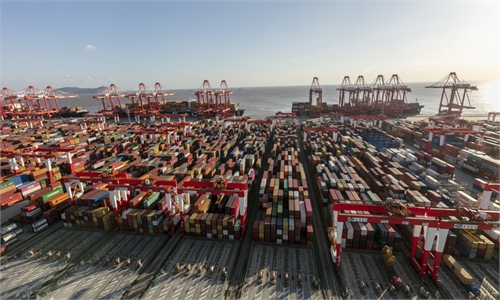US ‘political coldness, economic heat’ strategy toward China will continue: experts
‘Political coldness’ won’t stop ‘economic heat’: experts

Photo: VCG
Although China-US relations are frayed, bilateral trade is still going strong, as the 52.3-percent growth in dollar terms in the first five months was the fastest among all China's major trade partners. The figure indicates that no matter how Washington tries to provoke ideological or geopolitical conflict with China, it cannot stop mutually beneficial trade relations.
Against the backdrop of the US' domestic political rivalry, the "political coldness but economic heat" situation with China will continue, experts said, adding that the US may intensify its ruthless assault on China, but trade and economic exchanges between the two economic powers will continue.
The latest trade figures were released after three US senators visited the island of Taiwan on Sunday and the Biden administration expanded a Trump-era sanctions list to cover 59 Chinese companies to which Americans are barred from investment.
But at the same time, Chinese and US economic officials talked twice within a week, marking the resumption of normal economic communication and also showing that efforts are being made to solve problems in a pragmatic manner. But Washington's hardball tactic remains the major source of uncertainties in bilateral relations.
China-US trade surged by 52.3 percent in dollar terms from January to May to $279.64 billion, according to Chinese customs data released on Monday. The growth rate was the fastest among China's major trade partners, compared with trade growth with the EU (38.7 percent) and with ASEAN (39.1 percent).
Chinese exports to the US expanded 49.8 percent and imports jumped 59.8 percent, though the growth rates were slower compared with January-April.
The new trade statistics reflected that China-US trade is mutually beneficial as it maintained growth amid the coronavirus pandemic, Gao Lingyun, an expert at the Chinese Academy of Social Sciences in Beijing, told the Global Times on Monday.
"The slower growth, compared with the first four months, also reflected that the US economy and its coronavirus situation are improving," Gao said, pointing out that both countries' economic recoveries play important roles in promoting global economic resumption.
According to Tian Yun, former vice director of the Beijing Economic Operation Association, trade volume between China and the US in the first five months was "astonishing."
"Based on the growth, bilateral trade may hit 4 trillion yuan, or $600 billion for the whole year. That is to say, the China-US trade value in 2021 is very likely to surpass the record high of 2018 and reach $640-650 billion," Tian told the Global Times on Monday.
China's trade surplus with the US stood at $132.46 billion in the first five months, compared with $100.68 billion in the January-April period.
The situation of "political coldness but economic heat" under the Biden administration is unlikely to change in the short term, according to Tian.
"On the one hand, the Biden administration wants to show its advantages and gain interests by safeguarding the US-dominated international order. Also, it needs to cope with pressure and competition from the Republicans," he said.
"On the other hand, Americans are clear that they rely on cooperating with China economically, no matter on trade or finance," he noted.
Chinese Vice Premier Liu He held virtual conversations with US Trade Representative Katherine Tai and Treasury Secretary Janet Yellen within a period of six days recently, sparking optimism over enhanced communication between the two.
"Both parties thought that the exchanges were professional, candid and constructive. China and the US have started normal communication in the economic and trade fields," Gao Feng, a spokesperson for China's Commerce Ministry, told a routine press conference on Thursday in Beijing. Gao stressed that in the two dialogues, both sides adopted an attitude of equality and mutual respect.
"The US deficit financing may be one of the bargaining chips during the talks. If the US ignores its inflation and allows it to become even higher, the severe inflation could cause a crash for the US economy and its dollar system," Tian warned.
As media reports said, the Biden administration is conducting a review of the country's trade policy with China, ahead of the expiry of the phase one trade deal at the end of 2021. However, US Trade Representative Tai said the bilateral trade relationship has a "significant imbalance."
"There are parts of this trade relationship that are unhealthy and have over time been damaging in some very important ways to the US economy," Tai said on Saturday in response to a question about whether the US would continue with the phase one trade deal and maintain tariffs on Chinese goods, Bloomberg reported.
Gao regarded Tai's remarks as "irresponsible," as he said that the rhetoric was influenced by some anti-China ideology in the US.
"[The remarks] ignored the rising calls by US consumers and producers to cancel the tariffs," Gao said, adding the commitment by China to finish the goals set in the phase one deal had not changed, but the US should provide guarantees.
For instance, in May, China bought 9.6 million tons of soybeans, a 29-percent rise compared with 7.45 million tons in April. Soybean is one of the major agricultural products China vowed to buy from the US under the phase one trade deal.
Gao, a close follower of China-US trade tensions, pointed out that the principle of mutually beneficial China-US trade is to resolve disputes through communications, and China always adopts an open attitude towards holding consultations.

